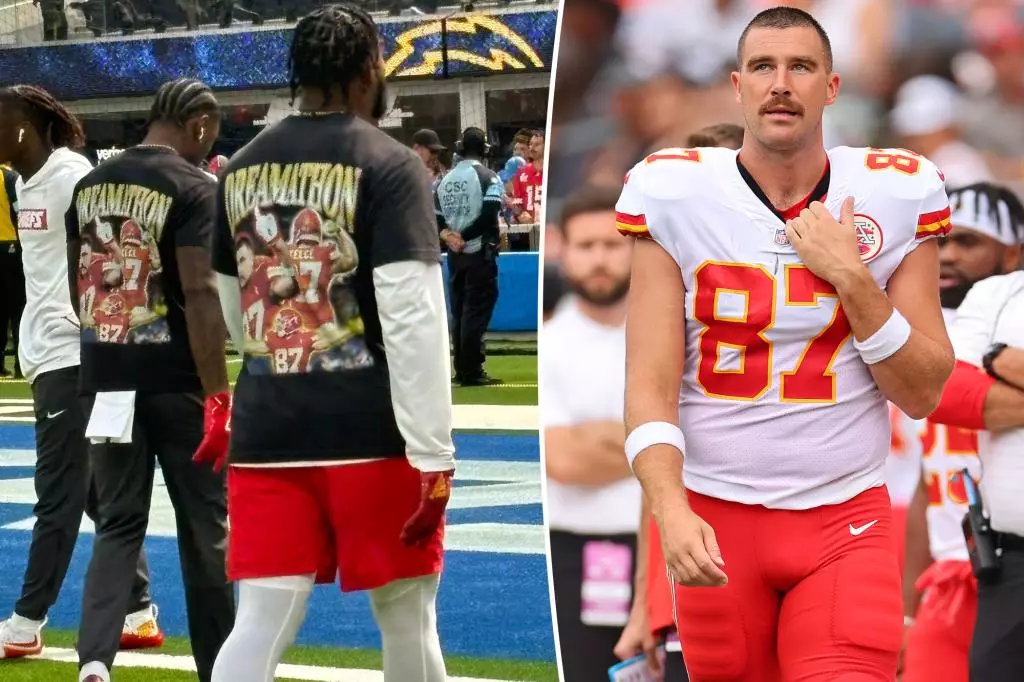In the high-stakes world of the National Football League (NFL), public scrutiny can loom large over the performance of players, especially those who enjoy a significant spotlight. Recently, the Kansas City Chiefs have become a case study in team unity amid external criticism, specifically regarding their star tight end, Travis Kelce. This article explores the recent events that encapsulate the importance of solidarity in sports while highlighting the individual and collective challenges faced by professional athletes.
Before a crucial match against the Los Angeles Chargers, Chiefs wide receivers—Rashee Rice, JuJu Smith-Schuster, and Mecole Hardman—made headlines by wearing custom T-shirts emblazoned with Travis Kelce’s name. This act was more than a simple fashion statement; it was an overt demonstration of loyalty and support for a teammate navigating a turbulent media landscape. The shirts served as a symbolic gesture of solidarity, affirming that the Chiefs are not just a group of players but a cohesive unit standing by their leader. According to CBS Sports’ Tracy Wolfson, it was Rice who initiated this thoughtful tribute, underscoring Kelce’s role as a mentor and leader within the team.
The design of the shirts was carefully crafted, featuring images of Kelce in action, with the back displaying “Dreamathon,” the brand responsible for these custom pieces. Though the shirts may not be available for fans, their significance transcends merchandise; they represent a collective identity rooted in mutual respect. Notably, similar displays of teamwork occurred earlier in the season, when the group wore shirts in honor of running back Isiah Pacheco after his injury. This consistent show of support highlights a cultural commitment within the Chiefs’ locker room that prioritizes camaraderie.
Travis Kelce has not been without his share of scrutiny. Former ESPN analyst Todd McShay recently took a stark stance, suggesting that Kelce’s struggles on the field could be attributed to his newfound fame, largely influenced by his relationship with pop star Taylor Swift. McShay’s comments serve as a reminder that the pressures of the public eye can be a double-edged sword—while celebrity status brings fame, it can also open avenues for criticism that impact a player’s performance.
The narrative surrounding Kelce is not unique; it reflects a broader phenomenon where athletes grapple with maintaining performance amidst distractions, both internal and external. Critics like McShay have asserted that increased media attention can divert focus. Statements comparing Kelce’s physical appearance from previous seasons serve as a stark reminder that public figures are held to rigorous standards, and any perceived drop in performance is often met with biting commentary.
In the face of criticism, Kelce’s response has been one of introspection and accountability. On his “New Heights” podcast, which he co-hosts with his brother Jason Kelce, he candidly discussed his performance issues, admitting the need for improvement. This acknowledgment is crucial in a sport where individual accountability can impact team dynamics. Kelce articulated his desire to “clean it up” and identified specific instances—such as a crucial drop in a recent game—where he felt he could have performed better.
His commentary not only sheds light on his self-awareness but also reinforces an important lesson in professional sports: the ability to learn and iterate from mistakes is fundamental to success. Acknowledging shortcomings while remaining focused on solutions illustrates the growth mindset that is necessary for athletes under pressure.
As the Kansas City Chiefs navigate the ongoing season, the solidarity displayed by the team offers a refreshing perspective on the challenges athletes face. The T-shirts worn by Kelce’s teammates symbolize much more than support; they encapsulate a collective resolve to face criticism head-on while lifting one another up.
The narrative around athletic performance is often one-dimensional, reduced to statistics and media bites. However, the reality is far more complex, involving an athlete’s emotional and mental states shaped by success, failure, and the surrounding environment. For Travis Kelce, the journey ahead is about more than personal performance; it reflects a commitment to collective progression and the unwavering bonds of teamwork. In the end, it doesn’t just take skill to succeed in sports—it takes heart, unity, and the courage to face adversity together.

